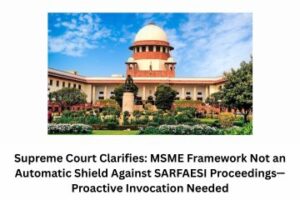Ranee Annapurni Nachiar vs Swaminatha Chettiar: A Landmark Case on Undue Influence in Contract Law
Table of Contents
- Introduction
- Background: Indian Contract Law and Free Consent
- The Indian Contract Act, 1872
- What is Undue Influence?
- Facts of the Case
- Parties
- Circumstances
- The Transaction
- Legal Issues Raised
- Arguments Presented
- (A) Arguments for the Appellant (Widow)
- (B) Arguments for the Respondent (Moneylender)
- Judgment and Analysis
- Judicial Findings
- Excerpts from the Judgment
- Outcome
- Legal Principles Established
- Relevance and Legacy
- Impact on Contract Law
- Widows, Moneylenders, and Judicial Protection
- Continuing Application
- Illustrative Summary Table
- Comparative Perspectives: Undue Influence in Other Jurisdictions
- Criticism and Limitations
- Enduring Lessons and Modern Relevance
- Conclusion
Introduction
Ranee Annapurni Nachiar vs Swaminatha Chettiar and Others is a landmark decision in Indian contract law. Decided by the Madras High Court on February 18, 1910, this case is pivotal for its analysis of “undue influence” and for its influence on subsequent interpretations of free consent under the Indian Contract Act, 1872. The facts reveal a scenario of a vulnerable individual—the widow Ranee Annapurni—who, under acute need and distress, borrowed money on harsh terms, exposing questions about fairness and the protection of weaker contracting parties.
This article undertakes a comprehensive exploration of the case, its legal context, facts, arguments, judgment, and long-term impact. It discusses Indian contract law principles, provides a critical analysis of the decision, and examines its enduring relevance for jurisprudence related to consent and contract formation.
Background: Indian Contract Law and Free Consent
The Indian Contract Act, 1872
A contract under Indian law requires, among other things, the “free consent” of the parties involved. Free consent is vitiated when, for example, it is obtained by coercion, undue influence, fraud, misrepresentation, or mistake.
What is Undue Influence?
Section 16 of the Indian Contract Act defines undue influence as a situation where one party is able to dominate the will of another and uses this position to obtain an unfair advantage. It further states that relationships involving real or apparent authority, or where one party is in a position of trust, fall within this ambit.
Facts of the Case
Parties
- Plaintiff/Appellant: Ranee Annapurni Nachiar (a Hindu widow)
- Defendant/Respondent: Swaminatha Chettiar (moneylender)
Circumstances
- The appellant was a poor Hindu widow who needed money to assert her right to maintenance and for her day-to-day survival.
- In her distress, she turned to the respondent, a moneylender, who agreed to lend her money but only on the condition that she would pay 100% annual interest on the sum borrowed.
- The transaction was facilitated through a vakil (legal adviser), but the widow’s evidence indicated that her acceptance of the terms was born out of necessity rather than genuine agreement.
The Transaction
- Key Terms: The borrower (Annapurni) agreed to pay an exorbitant rate of 100% interest per annum.
- Execution: The document was signed at a time when she had no other means of securing money and desperately needed funds to pursue maintenance.
The agreement, in essence, bound the widow to punitive terms that, in practical effect, were nearly impossible for her to satisfy.
Legal Issues Raised
The following legal questions were addressed by the court:
- Does a contract entered into on such extortionate terms due to the lender’s position and the borrower’s vulnerability amount to undue influence under Section 16 of the Indian Contract Act?
- Should such a contract be set aside or modified by the court if undue influence is established?
- What is the threshold for finding “undue influence” in situations involving poverty, lack of alternatives, or evident inequality in bargaining power?
Arguments Presented
(A) Arguments for the Appellant (Widow)
- The widow’s consent was not truly free but elicited through undue influence stemming from her vulnerable financial and social status.
- The lender used his superior position and financial muscle to impose unconscionable terms.
- The contract was, therefore, voidable at her discretion or at least should be set aside or reformed by the court to make it equitable.
(B) Arguments for the Respondent (Moneylender)
- The contract was a bona fide transaction entered willingly.
- The involvement of a vakil (advocate) on behalf of the widow meant that she was legally advised, emphasizing the voluntary nature of the agreement.
- There was no compulsion or manipulation, just market-driven high interest reflecting the risk.
Judgment and Analysis
Judicial Findings
- The court found that the widow was indeed in a position of acute financial distress and that her consent could not be regarded as free in the sense contemplated by law.
- The arrangement—for a loan at the usurious rate of 100% annual interest—was so exorbitant as to “shock the conscience” and was thus evidence of undue influence rather than fair dealing.
- The court emphasized that the mere presence of legal counsel did not eliminate the dynamic of dominance or negate the undue influence if the underlying necessities forced the party into accepting manifestly unjust terms.
Excerpts from the Judgment
“The widow’s evidence, which does not seem to have been shaken in cross-examination, was that she was in a poor state when she executed the document, and that her husband died ten years before and that she had no means for maintenance in the interval. The transaction was, no doubt, completed through a vakil who, in a sense, may be said to have advised the widow, but the fact that she acted under advice does not, in our opinion, preclude her from asking for relief on the ground that the contract was induced by undue influence, or the Court from exercising the jurisdiction given by Section 19-A of the Contract Act.”
Outcome
- The court set aside the contract on grounds of undue influence and unconscionability.
- It reaffirmed the responsibility of courts to guard against the exploitation of vulnerable individuals, especially when contracts impose oppressive terms.
Legal Principles Established
- Unequal Bargaining Power: When a party has significantly greater bargaining power, and the weaker party is compelled by circumstances, courts will scrutinize for undue influence.
- Unconscionable Contracts: Exorbitant interest rates or terms that are unduly harsh may, in themselves, be evidence of vitiation of free consent.
- Role of Legal Counsel: The mere involvement of legal advisers does not neutralize undue influence if the relationship or context supports a finding of dominance.
- Relief by the Court: Contracts tainted by undue influence are voidable and may be set aside, or the offending terms modified by judicial intervention.
Relevance and Legacy
Impact on Contract Law
- The case is foundational in the development of Indian law concerning undue influence, especially in transactions involving widows, minors, the illiterate, or anyone under pressure.
- It clarified that courts must look beyond mere formal compliance and inquire into the real substance of agreements, especially where terms are manifestly unfair or arise out of distress.
Widows, Moneylenders, and Judicial Protection
- At the time, widows were especially vulnerable to exploitation due to social and legal handicaps. The court’s robust approach in this case sent a strong signal to moneylenders and others dealing with disadvantaged parties.
- The judgment recognized that market practices—such as exorbitant lending rates to the desperate—should not be shielded from equitable intervention.
Continuing Application
- Ranee Annapurni Nachiar vs Swaminatha Chettiar remains frequently cited in law school syllabi, textbooks, and subsequent judgments about undue influence, usury, and fair bargaining.
- It informed the drafting of consumer protection and social welfare legislation aimed at curbing exploitative contractual practices.
Illustrative Summary Table
| Factor | Appellant (Widow) | Respondent (Moneylender) | Court’s Stance |
|---|---|---|---|
| Social/Financial Status | Extremely Vulnerable | Powerful, Moneyed | Prefer protection for vulnerable party |
| Consent Obtained | Out of necessity/distress | Seemingly voluntary | True consent absent if vitiated by distress |
| Contract Terms | 100% interest (usurious) | High risk justifies high interest | Usurious term is per se suspect |
| Legal Advice | Present (vakil involved) | Invoked as proof of fairness | Not decisive; context dictates realities |
| Outcome | Relief sought (voidable) | Enforcement sought | Contract set aside/modified under law |
Comparative Perspectives: Undue Influence in Other Jurisdictions
Indian law’s approach—heavily influenced by this case—resonates with equitable doctrines in English law, where “undue influence” allows the setting aside of unconscionably procured bargains. The principles in Ranee Annapurni Nachiar have parallels in major English cases like Allcard v. Skinner (1887), reinforcing a universal judicial skepticism towards contracts procured from the weak by the powerful, especially when bargain terms are egregiously unfair.
Criticism and Limitations
Judicial Paternalism vs. Freedom of Contract: The case exemplifies a strong paternalistic stance, prioritizing protection of the vulnerable over strict application of freedom to contract. Critics sometimes argue that over-intervention may stifle market flexibility and the ability of parties to negotiate risk-based terms.
Evolving Standards: As social welfare and consumer protections improve and the literacy, awareness, and autonomy of parties increase, courts today must carefully assess what constitutes true “undue influence” rather than always presuming vulnerability.
Enduring Lessons and Modern Relevance
With microfinance, high-interest payday loans, and informal lending still prevalent, the issues at the heart of Ranee Annapurni Nachiar vs Swaminatha Chettiar remain timely. Every time courts adjudicate contracts between powerful lenders and desperate borrowers, the wisdom of this case—balancing economic realities with fairness—comes to the forefront.
Conclusion
Ranee Annapurni Nachiar vs Swaminatha Chettiar remains a milestone in Indian legal history, exemplifying the core idea that contracts must be freely and fairly entered into, and that the courts have a solemn duty to intervene where disparity of power and distress leads to unconscionable agreements. Its philosophy endures in the quest for substantive justice in contract law, reminding us that law stands with the vulnerable against exploitation masked as contract.
This article presents an in-depth analysis suitable for law students, practitioners, and scholars interested in the principles of contract law, undue influence, and equitable relief as applied and developed in India.
References:
- https://www.scribd.com/presentation/458457341/INDIAN-CONTRACT-ACT-1872
- https://www.casemine.com/judgement/in/5609af2be4b0149711415b4e
- https://sci.gov.in/supremecourt/2017/25283/25283_2017_Judgement_10-Nov-2017.pdf
- https://main.sci.gov.in/supremecourt/2018/4802/4802_2018_2_1501_49136_Judgement_03-Jan-2024.pdf
- https://api.sci.gov.in/jonew/cl/2025-07-21/M_J_1.pdf
- https://www.casemine.com/search/in/ANNAPURNA+Vs
- https://main.sci.gov.in/pdf/LU/27042023_135802.pdf
- https://www.casemine.com/judgement/in/645ff69b96286752ef029bf0
- https://citeseerx.ist.psu.edu/document?repid=rep1&type=pdf&doi=01e98c8aa7e4a23c6843ff749c13133a5edb0138
- https://thelawcommunicants.com/coercion-undue-influence-fraud-and-misrepresentation/




